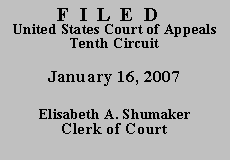

| CYNTHIA R. PINKEY, |
|
| v. | |
| JOE ORTIZ, Director; WARDEN JOAN SHOEMAKER; THE ATTORNEY GENERAL OF THE STATE OF COLORADO, |
appealability (COA) that would allow her to appeal the district court's order denying her habeas corpus petition under 28 U.S.C. § 2241. See 28 U.S.C. § 2253(c)(1)(A). Ms. Pinkey initially filed this suit under § 2254, but because she is disputing the execution of her sentence rather than the fact of her confinement, the district court properly interpreted her petition as a challenge under § 2241. Because we conclude that Ms. Pinkey has failed to make "a substantial showing of the denial of a constitutional right," we DENY her request for a COA and dismiss the appeal. Id. § 2253(c)(2).
Ms. Pinkey pleaded guilty to theft in the Arapahoe County District Court in Colorado and was sentenced to serve ten years imprisonment, to run concurrent with a sentence she was already serving. The petitioner has a direct appeal pending in the Colorado Court of Appeals, although no action seems to have taken place on it for several months. Concurrent with her appeal, Ms. Pinkey filed an original petition for writ of mandamus to the Colorado Supreme Court, disputing whether she had been given proper credit for time served after indictment but before conviction. The court denied the mandamus petition without explanation on January 31, 2006.
Ms. Pinkey then filed this petition for habeas corpus in the United States District Court for the District of Colorado. The district court entered an order on May 25, 2006, denying the motion, but it did not issue a separate judgment document under Fed. R. Civ. P. 58(a). An order alone, without a judgment, is insufficient to trigger the appeal process or its thirty-day window. Clough v. Rush, 959 F.2d 182, 185-86 (10th Cir. 1992). The absence of a separate judgment document grants the petitioner a longer time period up to 150 days to file the appeal. Fed. R. Civ. P. 58(b)(2)(B). Because Ms. Pinkey filed her notice of appeal 33 days after the order was entered, the appeal is timely.
In order to bring a habeas claim under § 2241, Ms. Pinkey must show that she has exhausted her state-court remedies. Montez v. McKinna, 208 F.3d 862, 866 (10th Cir. 2000). The burden of exhaustion rests on the petitioner. Bond v. Oklahoma, 546 F.2d 1369, 1377 (10th Cir. 1976). "The exhaustion requirement is satisfied if the federal issue has been properly presented to the highest state court, either by direct review of the conviction or in a postconviction attack." Denver v. Kan. State Penitentiary, 36 F.3d 1531, 1534 (10th Cir. 1994).
Because her direct appeal is either abandoned or still pending the record does not make clear which Ms. Pinkey has failed to fully exhaust her claim on direct review. She claims instead that she has met the requirement of exhaustion through her mandamus petition to the Colorado Supreme Court. In Colorado, mandamus may be used, among other purposes, "to compel compliance by the department of corrections with final court sentencing orders, where prisoners lack any other adequate remedy." People v. Ostuni, 58 P.3d 531, 533 (Colo. 2002). Mandamus relief, like habeas relief, "is extraordinary in nature and is a matter wholly within the discretion of the Supreme Court." Colo. App. R. 21. The Colorado Supreme Court has held that the denial of a petition under Rule 21 does not indicate that the court has considered the merits of the argument. Bell v. Simpson, 918 P.2d 1123, 1125 n. 3 (Colo. 1996).
The Supreme Court, in Castille v. Peoples, 489 U.S. 346 (1989), held that a petitioner does not exhaust his claims by presenting them to the state's highest court for review in a discretionary or procedural "context in which [their] merits will not be considered unless there are special and important reasons." Id. at 351 (internal quotation marks omitted). We have noted elsewhere that Colorado Appellate Rule 21 fits under this discretionary, procedural category. Edmiston v. Colorado, 158 Fed. App. 980, 981 (10th Cir. 2005) (unpublished); Richardson v. Dep't. of Corr., No. 99-1108, 1999 WL 820221, at *1 n.1 (10th Cir. Oct. 14, 1999) (unpublished).
We find that the Colorado Supreme Court's dismissal of the petitioner's mandamus claim does not amount to a final judgment on the merits, and therefore that Ms. Pinkey has not exhausted her state-court remedies. Accordingly, we DENY Cynthia R. Pinkey's request for a COA and DISMISS this appeal. Ms. Pinkey also moved to proceed in forma pauperis. The district court denied petitioner's motion, holding that although her application contained a copy of the petitioner's prisoner trust fund statement, the information was not certified, as required by 28 U.S.C. § 1915(a)(2). Ms. Pinkey has not corrected the problem in her appeal to this court, and therefore petitioner's motion to proceed in forma pauperis is also DENIED. Ms. Pinkey's motion for appointment of advisory counsel is also DENIED.
Entered for the Court,
Michael W. McConnell
Circuit Judge
*.This order is not binding precedent, except under the doctrines of law of the case, res judicata, and collateral estoppel.